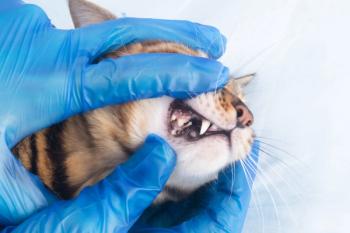
Most cats will tolerate collars, veterinary researchers report
Columbus, Ohio -- Almost three out of four cats will tolerate collars, according to multi-institutional veterinary study.
Columbus, Ohio
-- Almost three out of four cats will tolerate collars, according to new veterinary research.
In fact, in almost 60 percent of cases, the animals' tolerance of collars exceeded owners’ expectations, reports Dr. Linda Lord, an assistant professor of preventive medicine at The Ohio State University. Lord led a multi-institutional study on the issue with Dr. Margaret Slater from Texas A&M University (now with ASPCA), Dr. Julie Levy, of the University of Florida, and Brenda Griffin of Cornell University (now with University of Florida).
The study netted some 538 cats with 338 owners.
The researchers suggest that veterinarians should include a discussion about the importance of identification during annual wellness exams. They also say microchipping cats remains a useful backup identification method.
Proper fitting, with room for two fingers between the neck and the collar, is critical, Lord reports. And owners should carefully observe their cats' behavior with new collars for the first few days, when problems apparently are more common as the cats adjust.
"A lot of people start out with the dogma that cats can't wear collars, that they won't tolerate them or that they're dangerous. Now pet owners can look at this research and, if they own a cat, maybe they will now consider that they will be able to put identification on them. A collar with an ID tag is probably a cat's greatest chance of ever being re-homed or brought back if it is lost."
In one community, 40 percent of lost cats were indoor-only cats. Also free-roaming cats without collars are likely to be fed by strangers, thereby reducing the likelihood that they will return home, or ignored as strays, the university reports.
"The return-to-owner rate is abysmal for cats. Fewer than 2 percent of lost cats are returned to their owners,” she says. "If we could get cat owners to try using a collar with identification, it would be a big deal."
The study is published in a recent issue of the Journal of the American Veterinary Medical Association.
Here are some more of the study's findings:
- Of 538 cats, 391 cats (72.7 percent) wore their collars for the entire six-month study.
- Owners of the 115 cats that did not successfully wear collars for six months reported the following reasons: The cat lost the collar (7.1 percent); the cat scratched excessively at the collar (4.8 percent); the collar continued to come off and the owner chose not to replace it (3.3 percent); or the collar got stuck in the cat’s mouth or on another object (1.5 percent).
- Owners of 303 of the cats (56.3 percent) said their pets tolerated the collars better than expected.
- Owners of 167 cats (31 percent) said their cats behaved as expected.
- Owners of 43 cats (8 percent) said their pets’ behavior with the collars was worse than they expected.
- Of the 478 cats scanned for microchip detection at the end of the study, three had microchips that had migrated away from the implantation region.
- Owners of 90 percent of the cats told researchers they planned to keep the collars on their cats after completion of the study.
This study was funded by the Humane Society of the United States, PetCo Foundation and Schering-Plough HomeAgain LLC.
Newsletter
From exam room tips to practice management insights, get trusted veterinary news delivered straight to your inbox—subscribe to dvm360.



